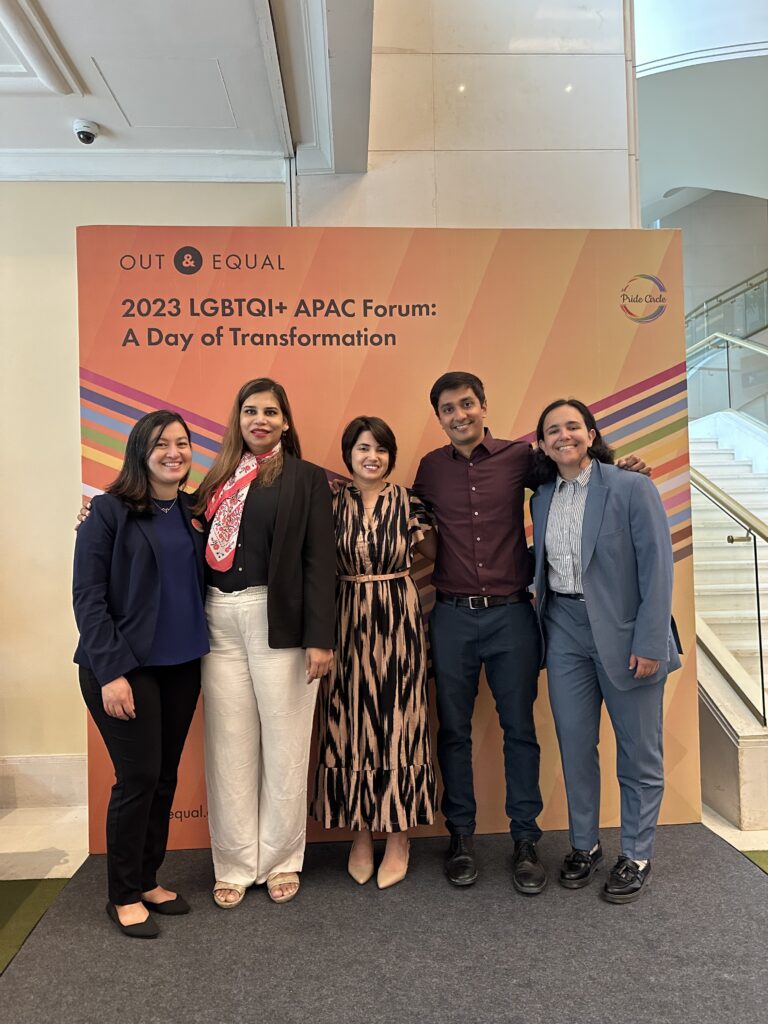by Akriti Rana (she/her), Manager, Global Impact Programs (APAC) at Out & Equal
After a lengthy hearing from petitioners seeking legal recognition for marriage equality, on October 17, 2023, the five-judge Constitution Bench, headed by Chief Justice of India (CJI) D Y Chandrachud, ruled 3-2 against legalizing marriage for LGBTQI+ couples.
It’s been one year since marriage equality was first proposed and five years since the court overturned colonial-era laws that criminalized homosexuality. Advocates have fought continuously for their constitutional right to equal protection under the law, and while this isn’t the ruling we’ve litigated, protested, and pushed for, this also isn’t the end of the road.
While the decision is disappointing, an article published by The New York Times titled, “India’s Top Court Rejects Gay Marriage, While Voicing Sympathy,” notes some rays of hope within the ruling. They include:
- expanding the definition of discrimination to certain fundamental protections for Queer citizens, including the right to access goods and services without prejudice;
- legalizing marriage between transgender couples, with the caveat that one partner identifies as male, and the other as female; and
- the establishment of an expert committee that is focused on protecting the rights of India’s LGBTQI+ community.
“The right to choose one’s partner and the right to recognition of that union ought to be observed, even if the union does not constitute marriage.”
— Dhananjaya Yeshwant Chandrachud (he/him), Chief Justice of India
A Commitment to Equality
The business community has long demonstrated its ardent support for LGBTQI+ inclusion. For more than six years, Out and Equal has worked alongside corporate and community leaders to empower LGBTQI+ employees throughout APAC (Asia-Pacific).
In 2017, Out and Equal first began collaborating with corporate and community partners in China and India in an effort to educate, partner, and build not only inclusive workplaces, but entire communities where everyone belongs. We’ve convened, strategized, and drew strength from each other. And while we mourn the ruling of a missed opportunity to historically crown India, the 35th country in the world to legalize marriage equality, we remain hopeful.
Since first joining forces with our APAC Partners, Out & Equal has engaged hundreds of global and regional employers and empowered thousands of employees. Just this summer Out & Equal partnered with Pride Circle, India’s premier diversity and inclusion organization, to host the 2023 LGBTQI+ APAC Forum in Bangalore, India. The inaugural LGBTQI+ APAC Forum featured participants from ten countries, including influential leaders with roles in Diversity, Equity, Inclusion, and Belonging (DEIB), Human Resources (HR) and, Employee Resource Groups (ERGs)—all committed to workplace equity, marriage equality, and the countless civil rights inherent in such policies.

From Left to Right:
- Akriti Rana, She/Her, APAC Manager, Global Impact Programs
- Zainab Patel, She/Her, Petitioner for the Indian Supreme Court NALSA Case on Transgender Rights and for the Indian Supreme Court Marriage Equality Case
- Deena Fidas, She/Her, Managing Partner | Chief Program and Partnerships Officer
- Utkarsh Saxena, He/Him, Petitioner and Lawyer for the Indian Supreme Court Marriage Equality Case
- Corina Hendren, She/Her, Senior Manager, Global Impact Programs
The Road Ahead: Big Benefits to Business and Everyday Life
Research from the Williams Institute at UCLA’s School of Law, found that within the first five years of legalizing marriage equality, the US saw a boost in state and local economies by an estimated $3,8 billion. A positive outcome in India could have likely seen similar trends, especially given its $50 billion wedding industry, which suffered significantly during the COVID pandemic.
This past June, Nepal made a historic leap by becoming the first country in South Asia to legally recognize marriage equality. Taiwan is the only other country in the APAC region to extend these same rights to its LGBTQI+ citizens.* If economic indicators are a sign of things to come, more countries will certainly follow suit. In fact, within APAC, the Human Rights Campaign Foundation is currently tracking developments in support of marriage equality in Japan, Thailand, and the Philippines. Furthermore, public opinion on marriage equality is rapidly changing. This year, a Pew Research Center poll conducted in 24 countries found that 53 percent of Indians favored legalizing LGBTQI+ marriage, up from 15 percent in 2014.
While we are disappointed, we are not defeated. Let this moment galvanize us. We are resolute, we are resilient, and we are committed to achieving full equality for the LGBTQI+ community.
“Today is a day of sadness and yet of a firmer resolve, while the Supreme Court of India missed a once-in-lifetime chance to make LGBTQI+ Indians truly free to love – we, India’s children will continue our struggle where marriage equality doesn’t remain a distant dream.”
— Zainab Patel (she/her), Petitioner for the Indian Supreme Court NALSA Case on Transgender Rights for the Indian Supreme Court Marriage Equality Case
*Although Nepal legalized marriage in June 2023, at the time of this article’s release, no laws have been amended or created to reflect the newly instated policy.